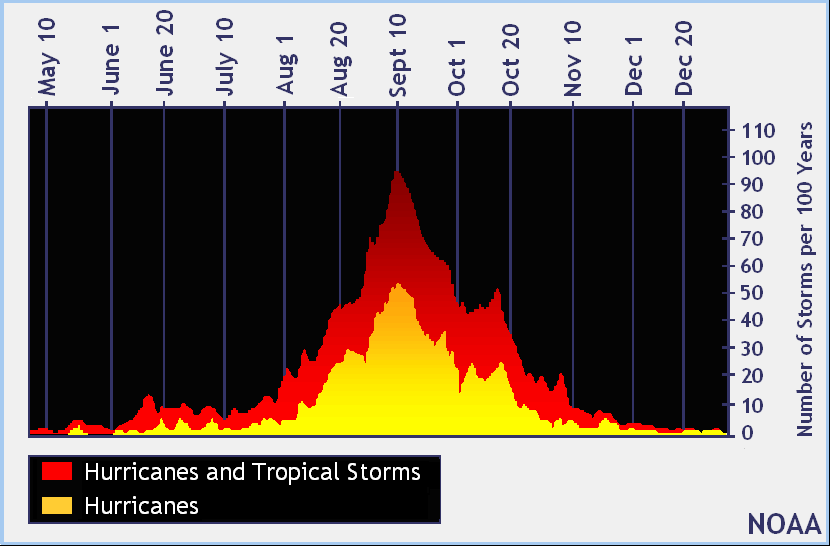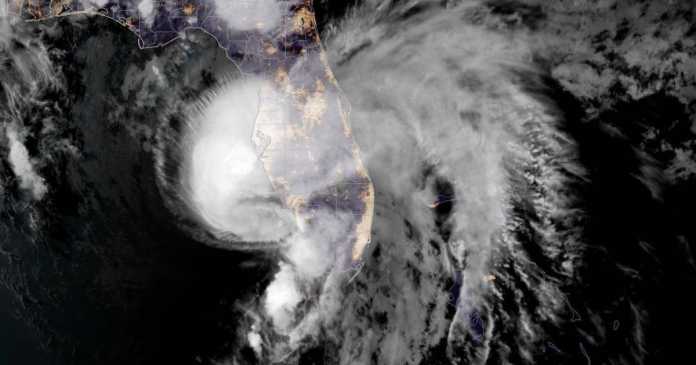Multiple mainstream media outlets ran stories and editorials last week claiming Hurricane Elsa, a tropical storm which barely qualified as a category one hurricane for a few short hours, was proof of human caused climate change. This is false. Although the average peak of hurricane season is on or just before September 10, as the figure below from the National Oceanic and Atmospheric Administration (NOAA) shows, hurricanes have not been uncommon before early July over the past 100 years. The earliest date for an official hurricane in the Atlantic Basin was recorded on January 3, 1938, 80 years of global warming ago.

Despite these facts, Yahoo New published a story, titled “Tropical Storm Elsa is the latest evidence climate change is happening now.”
“Tropical Storm Elsa became the earliest fifth named storm on record Thursday, the latest weather-related record this year that climate scientists warn is linked to climate change,” writes Yahoo News. “Elsa … fits into a pattern in which the changing climate makes conditions for life-threatening storms more favorable.”
As explored on Climate Realism here, here, here, and here, for example, data show no trend of hurricanes becoming either more numerous or more powerful over the past 150 years of modest warming.
EPA’s report, titled “Climate Change Indicators: Tropical Cyclone Activity,” released in May accurately states:
Since 1878, about six to seven hurricanes have formed in the North Atlantic every year. Roughly two per year make landfall in the United States. The total number of hurricanes (particularly after being adjusted for improvements in observation methods) and the number reaching the United States do not indicate a clear overall trend since 1878.
EPA’s conclusion that hurricanes have not become more numerous in recent years is not surprising. As detailed in Climate at a Glance: Hurricanes, U.N. Intergovernmental Panel on Climate Change (IPCC) data, illustrated in the figure below, show no increasing trend in tropical cyclone or hurricane numbers. As a result, in its 2018 “Interim Report” the IPCC observes there is “only low confidence for the attribution of any detectable changes in tropical cyclone activity to anthropogenic influences.”
As discussed in a From the Stacks podcast, Dr. Neil Frank, who served as director of the United States National Hurricane Center longer than anyone before or since, it was rare before 1950 to “name” a storm unless it made landfall somewhere. Also the criteria for declaring a weather front a named tropical storm has loosened in recent years. Frank says under the old system, many of the named storms in 2020, particularly tropical storms of short duration, would not have been given names.
The way storms were discovered, monitored, tracked, and whether they were named, has changed a great deal over the past 50 years. Records from the first half of the 20th century and before are understandably incomplete. Research indicates many storms that would now be counted as “tropical storms” and thus named, were not even known to have existed because they were of short duration at sea, with no ships having encountered them. Before the advent of weather radar, satellites, and storm-tracking airplanes, storms at sea were discovered and named only if a ship encountered and reported them.
As one NOAA report states:
“Existing records of past Atlantic tropical storm numbers (1878 to present) in fact do show a pronounced upward trend, correlated with rising SSTs (see Figs. 1 and 9 of Vecchi and Knutson 2008). However, the density of reporting ship traffic over the Atlantic was relatively sparse during the early decades of this record, such that if storms from the modern era (post 1965) had hypothetically occurred during those earlier decades, a substantial number would likely not have been directly observed by the ship-based “observing network of opportunity.” We find that, after adjusting for such an estimated number of missing storms, there is a small nominally positive upward trend in tropical storm occurrence from 1878-2006. But statistical tests reveal that this trend is so small, relative to the variability in the series, that it is not significantly distinguishable from zero (Figure 2). Thus the historical tropical storm count record does not provide compelling evidence for a greenhouse warming induced long-term increase.
Additionally, if one explores the tropical cyclone database for the Atlantic (HURDAT) more carefully, … one notices that there has been a very substantial increase in the number of short-duration tropical storms (storms lasting less than two days), while those storms whose duration exceeds two days have not shown a statistically significant increase since the late-19th Century (particularly if they are adjusted for likely missing storms). We are unaware of a climate change signal that would result in an increase of only the shortest duration storms, while such an increase is qualitatively consistent with what one would expect from improvements with observational practices. Thus, we interpret the increase of short duration storms as further evidence for a spurious increase in Atlantic tropical storm counts since the late-19th Century.”
If NOAA is to be believed, the alarming trend of early-in-season short-duration named tropical storms identified by Yahoo News, is not proof of climate change. Instead, it is a “spurious” trend attributable to inadequate tracking methods in the early part of the hurricane record.
When reporting on climate related matters, Yahoo News should follow the science, not the narrative humans are causing catastrophic climate change, which is not borne out by the data.

















